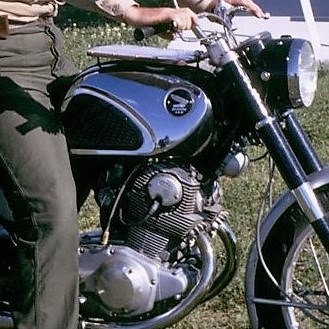
I take it as a point of pride that I do much of my own work on all my old cars. It is an extension of the richer understanding of the machine, and an additional source of enjoyment (most of the time) in the ownership experience.
Most of us go through life not fully understanding the how, let alone the why, of what makes our world work. These days, it seems there is precious little curiosity about such things.
Our machines reflect this zeitgeist. Older cars were manufactured with an optimism and sense of pride, striving to be lasting products of excellent quality. Newer cars understand their impermanence in the world, manufactured to live a life span that we have preconceived to be right around 100,000 miles. Push that envelope and you find where shortcuts have been made. These objects embrace the idea of impermanence.

Take for example Ol’ Blue, my 1999 Ford Ranger pickup, which I really don’t think of as all that old. She’s approaching 200,000 miles and I have asked a lot of her over the years. I’ve written before about my truck in “The Long Goodbye,” in which I bemoan the terminal frame rust which has taken hold and put our relationship in finite terms.
Nonetheless, I proceed with her maintenance schedule unabated, hoping to stave off the cancer and add quality time together.
I’ve hung two sets of lower A-arms on the truck due to a lack of grease zerks, and have had to replace the wheels because the steel rims rusted through at the bead. But even I was a bit dumbfounded when I had to replace the differential cover due to rust. How can a stamped heavy-gauge steel cover (filled with gear lube no less) develop pinholes and start to leak? “A common problem,” muttered the auto parts counterman with a sad shake of his head.
A friend suggested that the stamping process creates micro-fractures in lower-quality steel. Essentially, it’s life clock had started ticking before it was even fitted to the truck. Impermanence by design.
If I sound a bit philosophical in all this, it’s only because years ago I read a book that made the metaphorical connection between our machines and mindfulness. The 1974 book, Zen and the Art of Motorcycle Maintenance, was a thinly disguised travelogue and treatise on shared experience with mechanization, but also an owner’s manual on the philosophical tuning of the human machine.
It was the best-selling book that influenced a generation, and this week we learned that its author, Robert M. Pirsig, had passed away at age 88. With my hands full of pungent gear oil, his words on the metaphysics of quality rang in my ears, inspiring another look at his seminal work. Required reading for anyone who can see deeper meaning in the mechanical process.
While I’m at it, let’s acknowledge the passing this month of another artist who deeply understood the human connection to machines, J. Geils, guitarist and founder of the J. Geils Band. John “Jay” Geils Jr., age 71, was a platinum-selling rock musician who harbored a passion for classic Italian cars and motorcycles.
Geils amassed a private collection and curatorial staff that eventually morphed into KTR European Motorsports, a company offering exotic auto service, restoration and track support in Ayer, Massachusetts. Even after selling the company, Geils held one example of each of the five major classic Italian marques: Alfa, Lancia, Ferrari, Maserati and Fiat.
“I really wanted to work on Italian cars, but I found out I was pretty good at this rock music thing,” Geils said to Autoweek in a 2012 interview.
Probably an ambition that he would have continued given more time. A struggle we all have as we come to terms with the idea of impermanence.






